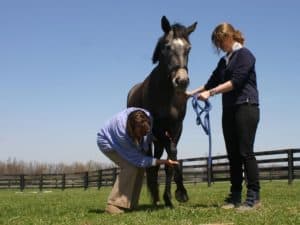Study Evaluates Equine Fecal pH during Abrupt Feed Changes
- Topics: Article, Grains, Pasture and Forages
A team of researchers in New Zealand recently set out to determine how dietary changes–from pasture to harvest forage and concentrates–affected fecal pH and certain bacterial populations of the hindgut.
It’s known that abrupt changes in a horse’s diet can have an adverse effect on a horse’s health, especially in the large intestine. Because resident microbes in the large intestine react to dietary changes, upset can result in digestive and/or metabolic complications, such as hindgut acidosis (abnormally high acidity in the hindgut) or laminitis. These changes can be measured by hindgut pH levels and the bacteria species present.
Mariette van den Berg, MSc, an equine nutritionist in New South Wales, Australia, and a team of researchers from Massey University, in Palmerston North, New Zealand, employed six Thoroughbred fillies accustomed to grazing perennial ryegrass and white clover with no additional feed supplementation.
The team removed the horses abruptly from pasture and housed them individually for 13 days. During this period the fillies consumed a diet of ryegrass/clover mixed hay, alfalfa chaff, a pelleted concentrate, and crushed barley. They increased the ratio of concentrate (pellets and barley) to conserved forages over the 13-day period, van den Berg noted
Create a free account with TheHorse.com to view this content.
TheHorse.com is home to thousands of free articles about horse health care. In order to access some of our exclusive free content, you must be signed into TheHorse.com.
Start your free account today!
Already have an account?
and continue reading.
Written by:
Kristen M. Janicki, MS, PAS
Related Articles
Stay on top of the most recent Horse Health news with












